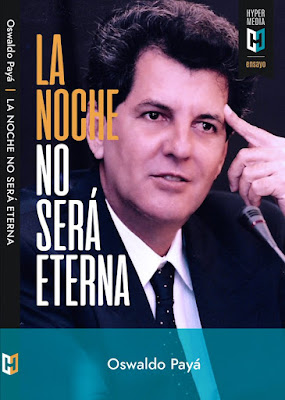Hearing held today starting at 2pm EST at the Inter-American Commission on Human Rights regarding Case 14.196 - Oswaldo Payá Sardiñas, Harold Cepero and others vs Cuba. Below is the Youtube video.
RFK Human Rights calls on the IACHR to hold Cuba responsible for the 2012 death of pro-democracy leaders Oswaldo Paya and Harold Cepero
On Tuesday, December 14th, during its 182nd period of sessions, the Inter-American Commission on Human Rights (IACHR) based in Washington, DC, held a public hearing on the case of Oswaldo Payá Sardiñas, Harold Cepero et al. V. Cuba.
On July 22, 2012, Oswaldo José Payá Sardiñas, a renowned Cuban dissident and human rights leader, was killed in a car crash near Bayamo, Cuba. Harold Cepero, a young activist who was traveling with him, died in the hospital soon afterwards. Both were prominent figures in the Christian Liberation Movement, which Mr. Payá had founded in the late 1980s to promote democracy and human rights in Cuba. At the time of the crash, they were on their way to the city of Santiago to meet with other movement leaders.
The car’s two other occupants, Ángel Carromero Barrios of Spain and Jens Aron Modig of Sweden, survived with minor injuries. According to Mr. Carromero, who was driving that day, official state vehicles had been following them for hours when they were suddenly hit from behind. Cuban authorities detained, drugged and threatened Mr. Carromero, ultimately forcing him to publicly confirm the official narrative that he had lost control and hit a tree. Despite evidence that the car was intentionally rammed by a vehicle bearing state license plates, Mr. Carromero was sentenced to four years in prison after a summary trial.
 |
| Oswaldo Payá Sardiñas, and Harold Cepero killed in a car crash near Bayamo, Cuba. |
Left with no possibility of legal recourse in Cuba, Payá and Cepero’s family members turned to the Inter-American Commission on Human Rights. Robert F. Kennedy Human Rights filed an initial petition on their behalf in 2013. In their merits brief submitted earlier this year, the victims and their representatives call upon the IACHR to hold the Cuban State accountable for the persecution and extrajudicial executions of Mr. Payá and Mr. Cepero, as well as the failure to duly investigate their deaths. They also allege that the families were threatened, harassed, and denied their rights to justice and due process. Finally, they accuse the state of arbitrarily detaining Mr. Carromero, mistreating him during his confinement, and subjecting him to judicial proceedings that did not meet international standards of justice and due process.
Family members of both Mr. Payá and Mr. Cepero attended the hearing, along with Mr. Carromero and representatives from RFK Human Rights. The IACHR heard the testimonies of Mr. Payá’s widow, Ofelia Payá Acevedo, and his daughter, Rosa Maria Payá, who described years of harassment by Cuban government officials, previous attempts on Mr. Payá’s life, as well as the circumstances and evidence of the attack. The hearing also presented an important opportunity to update the IACHR about the intensifying repression of human rights advocacy and dissent in Cuba. Just last month, state police and security agents surrounded protest leaders’ homes in an apparent bid to intimidate the population and quash a planned nationwide demonstration.
“This case offers an opportunity to illustrate the systematic patterns of repression and persecution of dissent by the State of Cuba, and the extreme length to which the regime is prepared to go to stall democracy from flourishing in the country,” said Kerry Kennedy, president of Robert F. Kennedy Human Rights. “It is our great hope that putting the details of this case on full display after so many years will prompt the IACHR to act and issue a favorable decision soon holding the State of Cuba responsible for the murders of Payá and Cepero.”
For decades, the Cuban State has severely restricted its people’s rights to free expression and association. The facts of this case reflect a broader pattern of repressive tactics employed against political dissidents and human rights defenders, including harassment, physical attacks, and arbitrary arrests and detention. Mr. Payá and Mr. Cepero themselves had been the victims of various threats and attacks long before the collision that took their lives. Less than two months before Mr. Payá’s death, another vehicle rammed into his own with such force that his car slid across the road and overturned.
“To challenge a totalitarian system seeking truth, justice, changes that will enable Cubans to access their rights, to move to sincere democratic changes—in totalitarian systems almost always costs people their lives, or else great sacrifice,” said Ms. Acevedo. “Since Oswaldo founded the [Christian Liberation Movement] in 1988, he was threatened with death multiple times by state security, following orders, of course, from the Castros.”
Mr. Payá refused to accept financial support from the United States, defying the Cuban government’s attempts to paint him as a foreign agent. His relentless activism in support of a peaceful transition to democracy—including the Varela Project, a petition drive that garnered more than 25,000 signatures in support of a referendum to guarantee civic freedoms—won him international acclaim and numerous awards. Today, his legacy lives on in the work of his daughter, Rosa Maria, who is recognized as one of the country’s leading democracy advocates.
The Inter-American Commission thanked the participants and sent a message of solidarity to the Cuban people. “Those of us who work on human rights in the Commission sometimes ask ourselves, why continue in this, why do they [victims] keep coming? And it is because dignity is like that, and because truth and justice have to make way,” said Julissa Mantilla, first vicepresident of the IACHR.
RFK Human Rights is honored to represent the Payá and Cepero families in their quest for truth and justice, which are the necessary foundations of a real democratic future for Cuba.



















